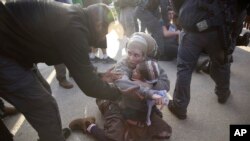The White House said late Thursday that new or expanded Jewish settlements beyond their current borders “may not be helpful” in achieving peace between Israel and the Palestinians.
But spokesman Sean Spicer said that while the Trump administration does not believe the existence of settlements is an impediment to peace, it has not taken an official position on settlement activity.
Spicer said President Donald Trump looks forward to his talks with Benjamin Netanyahu when the Israeli prime minister visits Washington later this month.
Palestinians say Jewish settlements on West Bank land that they want as part of a future state is the major roadblock to peace. Israel says Palestinian refusal to recognize the Jewish state is stopping the talks.
Settlers vow to build
Israel was furious when the United States, under former President Barack Obama, abstained instead of vetoing a U.N. Security Council resolution in December, calling the settlements illegal and demanding Israel stop building them.
Jewish settlers, many of whom are transplanted Americans, told reporters before Thursday’s White House comments they expect Trump will not stand in the way of a new wave of settlements.
“After eight years of Obama, who didn’t let us build, now we’ll say, ‘We will build and build,’” said Shilo Adler, who heads the Yesha Council, which represents Jewish settlers in the West Bank.
“Now is history-making time,” Adler told a reporter for The Washington Post. He said the settlers are seeking 100,000 new homes, which would at least double the Jewish population in the West Bank.
Clearing Amona, other settlements
Meanwhile, Israeli security forces Thursday continued to clear the last remaining people from an illegal West Bank settlement.
Most of those remaining in the Amona settlement were taking refuge inside a synagogue.
Police began clearing the settlement Wednesday. They were confronted by hundreds of residents and protesters who set up barricades and threw stones.
The protesters yelled at the police, “Jews don’t expel Jews.” About 20 officers were hurt.
Palestinians applaud return of their land
Israel’s Supreme Court ruled in 2014 that the Amona settlement was built on private Palestinian land and would have to be demolished. Ultra-conservative Israeli officials fought to reverse the ruling.
Netanyahu has approved 3,000 new homes for the evacuated settlers and others elsewhere in the West Bank.
As Amona’s uprooted residents and their supporters bemoaned their fate, Arabs in a neighboring Palestinian village clapped and shook hands.
Ibrahim Yakoob, a Palestinian farmer who is part owner of the land that Amona occupied, told reporters: “It feels great to see settlers being taken off my land and their caravans removed. The court has done a good thing, although it has taken a long time.”
Amona is the largest of around 100 unauthorized outposts erected in the West Bank without permission but generally tolerated by the Israeli government. Built in the 1990s, Amona stretches out over a rugged, grassy hilltop and looks out across a valley onto Palestinian villages.






